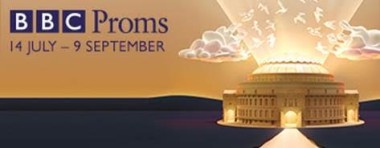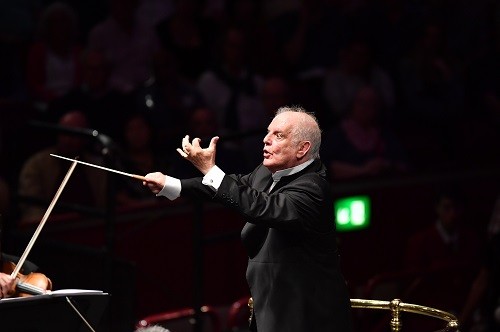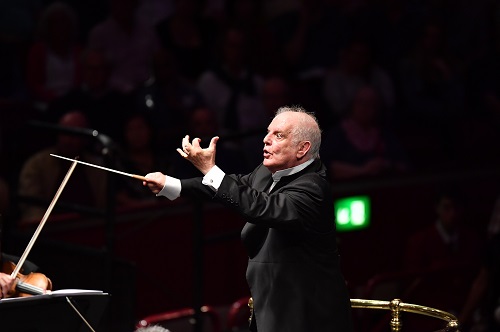
 United Kingdom 2107 BBC PROMS 4 – Birtwistle & Elgar: Staatskapelle Berlin / Daniel Barenboim. Royal Albert Hall, London, 16.7.2017. (CC)
United Kingdom 2107 BBC PROMS 4 – Birtwistle & Elgar: Staatskapelle Berlin / Daniel Barenboim. Royal Albert Hall, London, 16.7.2017. (CC)

Birtwistle – Deep Time (2016, UK premiere)
Elgar – Symphony No.2 in E flat, Op.63
Time has long been at the forefront of Sir Harrison Birtwistle’s mind. The Triumph of Time 1971/2) is one of his masterworks. So is Earth Dances (1985/6), a meditation on the earths’ layers as represented by orchestral strata; the world premiere of the latter at the Royal Festival Hall years back was one of this writer’s formative experiences. The two elements fuse in Deep Time, the title referring to the measurement of huge time spans and derived from John McPhee’s 1981 book Basin and Range. So it is that characteristic processionals rub shoulders with complex textures that are predominantly bass-driven. The scoring of Deep Time includes tubas, contra-bassoons and contrabass- and bass clarinets. On another level it feels like bring driven, slowly, through the inner regions of a very wise, very ancient mind, perhaps the of Gaia herself.
Premiered in Berlin last month, the approximately 25-minute Deep Time (a BBC/Staatskapelle Berlin co-commission) reveals Birtwistle’s mastery of expression and orchestration in no uncertain terms; its trajectory from a grinding opening with echoes of the start of Mahler’s Ninth Symphony as lines struggle to form into Birtwistle’s long-limbed endless melodies through to an appearance of clock (as opposed to geological) time at the end never stops gripping the listener for a second. One might pick up the occasional half-memory of Stravinsky here and there, but Birtwistle’s voice is now so individual and confident they appear ghosts of another past, perhaps even from a buried time. The performance was a masterwork in itself. Barenboim’s grasp of Birtwistle’s writing was astonishing, the orchestra one hundred percent behind him. Concentration never flagged from the orchestra (the same cannot be said of some audience members alas). Mark well, we will hear a lot more of this piece.
The Elgar Symphony was the first of three Elgar pieces to be heard this particular evening (of which more later). Never, surely, have the references to the European symphonic tradition in Elgar’s score been so aurally obvious as here. The word ‘nobilmente’ graces the indication for the first movement; horns nodding to a tradition crowned by Richard Strauss; repeatedly the hyper-disciplined brass crowned climaxes with gold. The symphonic funeral march originally written for the composer’s friend Alfred Rodewald that is the second movement was the work’s jewel, the climax perfectly prepared by Barenboim, the end beautifully controlled by the superb players. In huge contrast came the elfin Rondo third movement and its rollicking tunes. The first violins were incredibly well disciplined before the troubled nobilmente of the finale took us to the works wonderful conclusion. The Berlin strings were incredibly beautiful of sound; in addition, it is difficult to imagine a more disciplined performance throughout.
Encores were expected. Perhaps Barenboim’s speech was less so, a rather long but certainly inspiring call for the re-introduction of education as central to our lives and that ‘isolation tendencies’ (read the unstated word ‘Brexit’) serve no-one. The two encores brought us more Elgar: ‘Nimrod’ from the Enigma Variations, beautifully turned out, and Pomp and Circumstance No.1 in another early outing (it had already done service in Prom 2: see Alan Sanders’s review).
Colin Clarke
For more about the 2017 BBC Proms click here.
